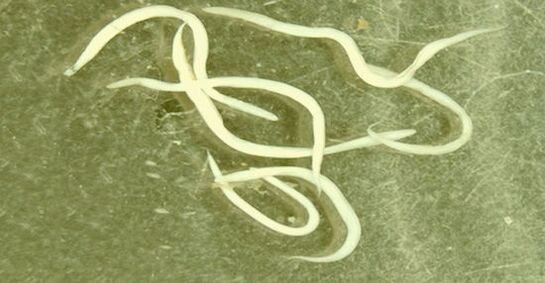
Many people will be surprised if they find that a person often lives "not alone". In him, as well as in his body, microbes continue to exist. Without this mutually beneficial coexistence relationship, a person would be seriously ill and unable to survive. Therefore, there is a normal microbial population on the surface of healthy skin, which can protect it from the reproduction of harmful microorganisms. In women's vagina, there are Lactobacillus or Delein rods, which form a normal acidic environment. Finally, in the large intestine and feces of healthy people, there are hundreds of billions of microorganisms, which participate in the digestion of food, the production of vitamins, and the protection of people from diseases.
but,Except for microorganisms, all other random creatures-protozoa and worms-are parasites. . . Some began to multiply, "poisoning" our body. How to detect parasites in the human body?

This question is by no means groundless. Of course, if the doctor points to a person and says that there are parasites in a person, then the patient will go for an examination right away. For example, if small worms are accidentally found in fresh feces, the same situation can happen. The problem is clear: the worm invasion is obvious. All that is left is to make the diagnosis and start treatment.
But the parasites have learned to "keep the nose out", and their presence in the body usually leads to incomprehensible changes, and the patient will never associate these changes with the presence of the parasite. What are these symptoms? For example, how to suspect chronic helminthiasis?
Common signs of parasites
All kinds of parasitic diseases, from accidental (short-lived) to ending with parasites that continue to live in the human body, are manifested as symptoms. They can be divided into two groups:
- specific(Characteristics of certain types of parasites), for example, edema and muscle pain with trichinosis, acute appendicitis when crawling into the roundworm appendix, or severe itching in the perianal area in the presence of pinworms.
However, if there are such symptoms, it would be nice to be able to accurately point out the cause of the invasion (called pathology in medicine). But if there are no such direct signs, how can one tell whether there are parasites in the human body?
For this, please check for other common symptoms of parasites-non-specific.
- Non-specificSymptoms are signs that the body is poisoned by the waste of worms and protozoa.
In turn, these signs most often appear in the form of two syndromes:
- Allergic reactions of the body to parasites;
- Poisoning syndrome or poisoning.
How to identify the parasites in the human body and what symptoms can they cause?
The most common symptoms of parasitic diseases
- Gradually but steadily decreasing body weight, independent of chronic stress, increasing physical activity level;
- The appearance of insomnia. It may be caused by skin itching and the release of toxins, for example, during the migration of larvae. In this case, the person only feels his health deteriorates at night and at night.
- The appearance of nausea and vomiting, sometimes due to aversion to food;
- Anorexia, or a significant decrease in appetite, until it disappears completely. For example, children with giardiasis usually do not like food in the morning;
- Significant weakness, weakness, and decreased performance;
- Daytime sleepiness occurs;
- The temperature rises to sub-heat (37. 1-37. 5);
- There is a headache syndrome: headaches that have nothing to do with physical and mental stress.

The allergic manifestations of helminthiasis may vary. Urticaria may occur, unexplained skin itching may appear and disappear, allergic Kunck's edema and bronchospasm may occur.
under these circumstances,If you or your loved ones have the above symptoms, please consult a doctor. . .
Of course, this does not limit the scope of symptoms, but these are the most common.
About laboratory signs
How to identify the parasites in the human body through a simple test? For example, when studying the results of general blood tests, the following findings indicate the presence of worm invasion:
- anemia, Or decreased levels of hemoglobin and color index;
- Eosinophilia. . . Generally, the number of eosinophils does not exceed 5%, and their number increases with parasitic diseases.
Of course, you should not perform all tests on your own. The doctor knows what medicine to prescribe in each specific situation.
About accidental discovery
Sometimes, accidental discovery helps determine whether parasites are present in the human body. How did this happen?
- For example, through fluorescence contrast, the lung field is found to be abnormally dark, which may be a parasitic cyst;
- During brain MRI, single or multiple cysts can also be detected, usually without any symptoms.
In short, what must be said isAfter detecting these symptoms, make a specific diagnosis: Set up the immune response, analyze the stool, and if necessary, take the contents of the duodenum. Of course, life history is very important. Therefore, if a person took a rest the day before in hot countries such as Asia and Africa, swimming in places that are not recommended, or using water of questionable quality, or unwashed fruits, the possibility of worm invasion is very high.

In the same way, if the child has similar symptoms after going to school or kindergarten, and the parents determine that the cause is not the stress state caused by the influence of an organized team, then the reason to go to the pediatrics department is sufficient. Infectious disease expert.
The treatment of confirmed helminthiasis is carried out in a specialized helminthology (parasitology) room, which is usually present in each regional center of a major infectious disease hospital.



























